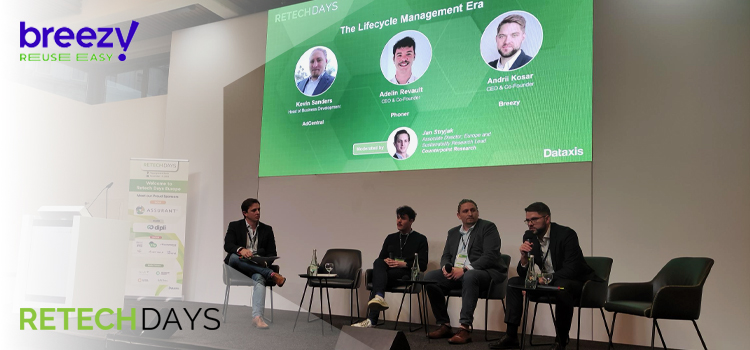Navigating the Future of the Sustainable Tech Market: Insights from GM Breezy Andrii Kosar at Retech Days
Breezy, a leading player in the refurbished electronics market that is a subsidiary of ASBISC Enterprises PLC (WSE: ASB), a leading value-added distributor, developer and supplier of ICT and IoT products, solutions and services on the growing markets of Europe, the Middle East and Africa, is vigorously advocating for a sustainable economy as a core component of the global green agenda.
This initiative is not only embedded within Breezy’s business philosophy but is also a focal point in its marketing strategy.
As part of this campaign, GM Breezy Andrii Kosar engaged as a panelist at Retech Days in Berlin on November 19th, contributing valuable insights to the discussion titled “The Lifecycle Management Era.” This session addressed critical aspects of lifecycle management in electronics, emphasizing the importance of sustainability in product development and post-consumer practices.
Current Landscape:
2023 saw the lowest smartphone sales in Europe since 2011, with only 148M units sold (Counterpoint Research). Despite YoY growth in 2024, the refurbished phone market has grown significantly and continues to expand.
Key Drivers:
- Eco-awareness: Consumers prioritize sustainability but often resist paying more.
- Rising new device prices.
- Regulatory influence: Regulations can both support and limit growth.
Challenges Facing the Industry:
1. Device Supply Shortage:
Consumers are keeping their devices longer, leading to fewer used phones on the market. Regulatory changes add to the uncertainty.
Solution: Trade-in programs are crucial. As GM Breezy Andrii Kosar stated, “Trade-in saves money, especially with added Top-Ups. Our in-store system, Breezy One, ensures accurate device evaluations for the best price.”
2. Industry Fragmentation:
Many companies specialize in only one stage of the remarketing cycle, increasing costs and reducing customer appeal. This leads to slim margins and challenges for survival. Andrii Kosar noted, “A circular model is most effective when controlling the entire process, from supply to sales, which explains the recent wave of acquisitions that will likely continue.”
3. Inconsistent Pricing and Grading:
The lack of uniformity makes buying refurbished devices less straightforward than new ones. Breezy addresses this by emphasizing transparency. “Every refurbished Breezy phone includes a QR code linking to its testing report with 55 quality checks,” Andrii Kosar explained. “Customers can also see high-resolution images of the phone, so they know what they’re getting.”
4. Spare Parts Availability and Costs:
High repair costs, such as screen or battery replacements, make purchasing new phones more appealing than repairs.
To learn more about the innovative recycling and refurbishing processes proposed by Breezy, visit the website https://breezy.band/.

